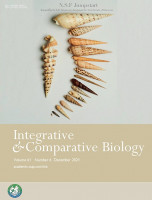“Evolutionary transitions of organisms between environments have long fascinated biologists but attention has focused almost exclusively on free-living organisms and challenges to achieve such transitions. This bias requires addressing because parasites are a major component of biodiversity. We address this imbalance by focusing on transitions of parasitic animals between marine and freshwater environments. We highlight parasite traits and processes that may influence transition likelihood (e.g. transmission mode, life cycle, host use), and consider mechanisms and directions of transitions. Evidence for transitions in deep time and at present are described, and transitions in our changing world are considered. We propose that environmental transitions may be facilitated for endoparasites because hosts reduce exposure to physiologically challenging environments and argue that adoption of an endoparasitic lifestyle entails an equivalent transitioning process as organisms switch from living in one environment (e.g. freshwater, seawater, or air) to living symbiotically within hosts. Environmental transitions of parasites have repeatedly resulted in novel forms and diversification, contributing to the tree of life. Recognising the potential processes underlying present-day and future environmental transitions is crucial in view of our changing world and the current biodiversity crisis.” view the publication

